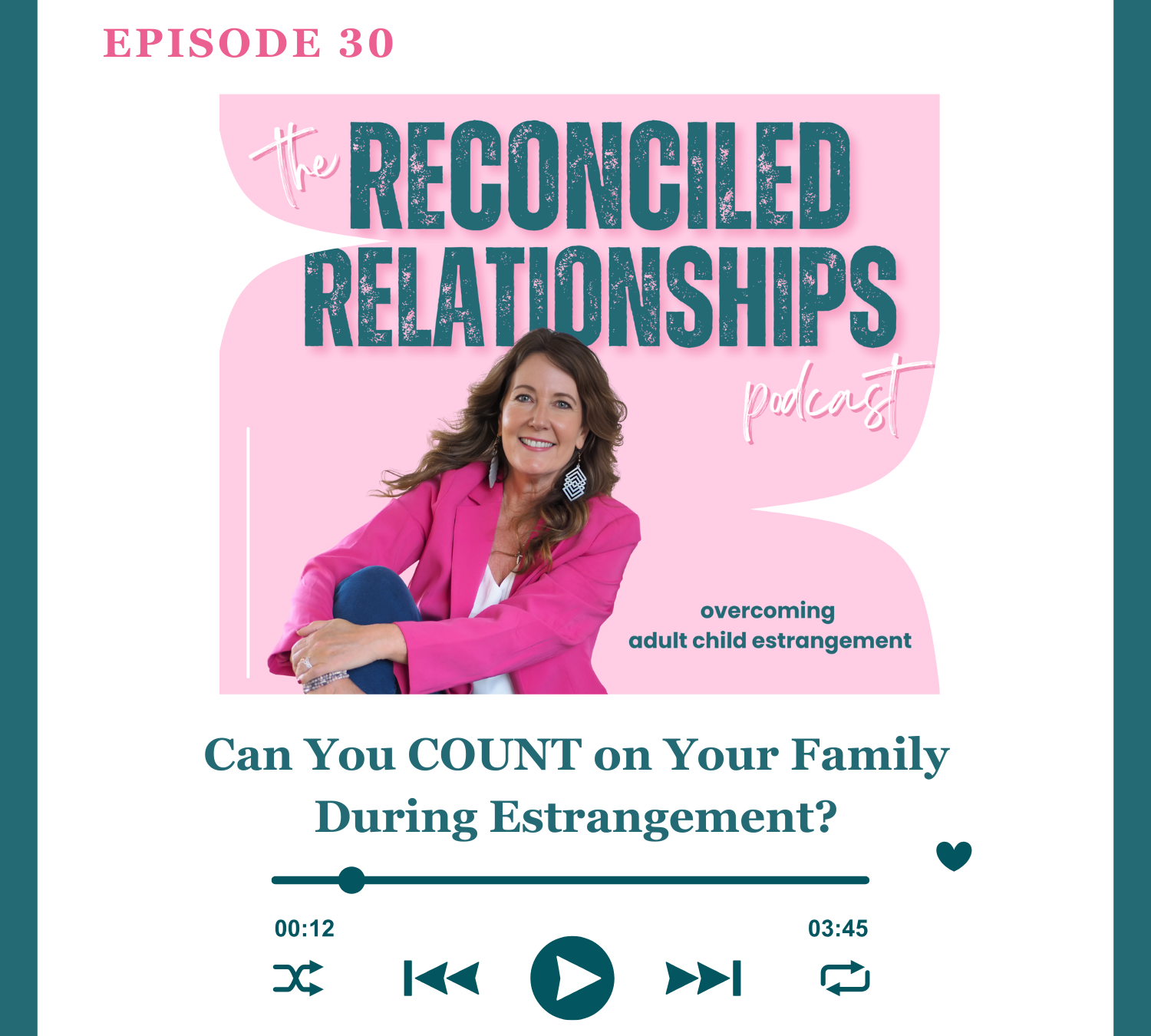WATCH THE EPISODE BELOW
LISTEN TO THE EPISODE BELOW
Estrangement can feel incredibly isolating, especially when the family you expected to lean on isn’t the safe space you hoped for. But there’s good news—support is out there. In this episode, I’ll share practical steps for finding support during estrangement, even if your family isn’t the right fit.
I’ll dive into four key points: how to ask your family for the right kind of support, setting boundaries to protect your emotional well-being, how to have honest conversations about your needs, and how to manage expectations with family members who may not be supportive.
Support isn’t just about having someone to talk to. It’s about finding the right people who will help you navigate the hard emotions and provide the encouragement and space you need. I’ll also talk about the importance of reaching out for support from professionals, friends, or support groups to ensure you don’t go through this alone.
Remember, you don’t have to walk this journey alone. Asking for help is a crucial step in your healing process, and you are worth it. If you’re struggling, take that courageous step and seek support—whether through family, friends, or professional help. You deserve it, and you don’t have to do this on your own.
KEYPOINTS FROM THIS EPISODE
-
Recognizing the types of support you need during estrangement: emotional, practical, or listening.
-
Setting healthy boundaries with family and friends to avoid unwanted advice and pressure.
-
Communicating openly and honestly about your emotional struggles to get the right support.
-
Managing expectations with unsupportive family members and focusing on those who can truly offer help.
QUOTABLE MOMENTS
-
“Support is definitely out there, even if your family isn’t the safe space you had hoped for.”
-
“You need the people that are going to lift you up. Be there for you.”
-
“Emotions are fleeting. We have to remember that we can’t make decisions based off emotions.”
-
“You have to ask for support. I don’t know you unless you contact me. Don’t continue to do this alone.”
TRANSCRIPT OF THIS EPISODE
[00:00:00] When you're going through estrangement, you might expect your family to be the ones that are lifting you up, but the hard truth is they're often not the ones who are going to get you through this, and the realization can feel very lonely. But here's the good news. Support is definitely out there. And today I wanna show you how to find it, even if your family isn't the safe space you had hoped for.
today I have four points I wanna share with you. So let's dive in.
Number one is how to ask your family for support. during estrangement. We need to recognize what type of support do you really need? What type of support are you really looking for? And it varies by person, by mom. However, much of it is universal and it matters because having a strong support system, is the first facet of the coaching that I actually do with my moms [00:01:00] in a group setting, but also one-on-one.
I need to know what type of a support system do you have because. That is what helps with the emotional resilience to get through a situation, and it also prevents feelings of isolation. I don't know how many of you are dealing with isolation, but I know I certainly did for a very long time until I started talking about the situation.
And it can feel super overwhelming you need to ask yourself when you're feeling overwhelmed, do I need a listening ear? Do I need encouragement or do I need practical help? at different times, you're gonna need one or the other, or all of the above, Because if you reflect on some past moments of emotional distress, whether it be this situation or something else, think about it like were you looking for advice?
Or did you just need someone to listen? the first thing you need to do is understand your own needs because that makes it easier [00:02:00] to ask for the right support. the moms that I serve, they're looking for all of the above. they need me to listen, but they also need practical advice and they need empathy to be quite honest.
And that's where our families can't always help. Or even our closest friends, these people love you like no other. It can get very frustrating and really hard to understand why. Why are they not the person that's gonna help me through this? This makes no sense, Sally,but trust me, they usually are not.
Number two is setting healthy boundaries. So what is the support that you really need and what are the boundaries around it? And now remember, these are people in your family, Or really close friends. But these are people that are safe for you to say these things to. Okay? So you have to remember that boundaries prevent unwanted advice or pressure, and it's also going to ensure you're getting the support that you need.
[00:03:00] Support that feels helpful, not draining, right? For some people, a group situation is not what they want because hearing other people's situation is too draining for them. I am super happy, and I love the group, the moms that I coach, because I do not feel that I hear that very often. These moms are uplifting even in the midst of their worst trial of their life.
These women are amazing, and I'm so grateful to know each and every one of them. But if a family member or a really close friend keeps telling you how to fix the situation. You can say something like, you know what, I really appreciate your concern, but right now I just need someone to listen without trying to solve it.
And that goes back to my last video about marriage, right? sometimes we just need that listening ear. We don't need our husband to fix it because he can't, doesn't matter how close you are or lack of, he's not probably going to be the one he certainly could be of [00:04:00] help. Absolutely.
If he's in the right frame of mind. we need to be direct, but we need to be kind to these family members so you can let them know what is helpful and what is not, so that way the support remains positive. And I'll just be frank with you if your sister or cousin or best friend can't remain positive.
Giving you support that you need, whether it's just that listening ear or practical advice, then I think I would shut that communication off when it comes to this topic. I'm not saying shut these people out. I'm just saying you need people who are going to remain positive, who are going to encourage you.
You can go in the deep, dark hole of your mind all by yourself. You don't need anyone else to help you with that. You need the people that are going to lift you up. Be there for you. And sometimes that is just a listening ear and everyone is capable of doing that. Some people don't do it very easily, or it might be a little bit harder because they want [00:05:00] to fix it.
So again, being really direct and clear about what you need is really important. For those of you moms that are ready to take that next courageous step, as I call it, towards taking care of yourself during this difficult time. If you're looking for a lifeline and you as a mom, as a person are committed to finding peace and support, then I'd like to explore how I can help you.
I do have an opportunity for a discovery call with me. It is not a coaching call. It is an opportunity where I get to learn more about what is going on in your journey. Mostly we're gonna talk about you. I need to know if we're the right fit for coaching. I need to know if you are ready to invest and really work on yourself, because after all.
The only person you can control is you and spots are definitely limited. So please only sign up if you're serious about prioritizing your own wellbeing and you wanna grow through this situation and you wanna heal. if that is you, then you can click the link in the show notes, for the discovery call and get that [00:06:00] scheduled.
I look forward to talking with you and serving you in the future. number three, we need to have some honest conversations about your needs. What does that look like? family members may not realize how much you're struggling unless you communicate it openly. Are you isolating? Are you pretending everything is okay?
Are you putting the smile on? These conversations have to be honest because No one knows exactly how you're feeling. We can presume by, you know, the look on our face, we can presume by what comes out of our mouth. But people who know you best are probably gonna be able to, read right through all of that.
if you were to say to that family member or best friend, you know what, I'm having a really, really, really tough time and I need your support. I don't need solutions. I just need someone to talk to, and you're my sister. You're my best friend. You're my husband, whoever that person is, and [00:07:00] focus on the emotions instead of explaining every detail of the estrangement.
And this is what we do on the discovery call that I was just mentioning. We could talk for days about everything that has happened with your son or daughter, but this helps me understand the situation. it's going to help your family member help you as well. You just need someone to talk to.
Let's focus on your emotions. 'cause emotions are fleeting. We have to remember that we can't make decisions based off emotions, but we don't need every detail of the estrangement. So that will help your family member help you as well. And number four is managing those expectations with the unsupportive ones.
So we all have some unsupportive family members. A lot of it stems back to being unable to empathize with you because they haven't been through it, right? your goal is to find those that can offer the support that you need, but not everyone is going to understand your situation, and that is okay.
[00:08:00] It's not their fault. But if a family member dismisses your feelings and says something like, I don't know what your problem is, you need to get over it. This has been going on too long. You know what? That's where you say, I understand that you have not dealt with this. I understand that this is hard to relate to, but I just need you to be here for me.
If a family member gives, continues to give unwanted opinions, then maybe you just say, I appreciate your perspective, but right now I need emotional support, not advice. if they are unable to provide that for you, then you know that they're not the one that's gonna help you through this. So it does take some work to figure out who those people are gonna be in your family, right?
Again, not everyone is going to understand this journey, but that doesn't mean you have to go through it alone. we all have, possible family support. Some of you don't. we need to seek support from friends, support groups, professional help, whatever you need. we deserve to be supported because you need to [00:09:00] heal.
Your son or daughter needs to heal as well. You can't do that for them. your job begins by being supported. You have to ask for it. I don't know you unless you contact me, The moms that I come across in my everyday life, I am absolutely helping them.
I don't know someone's going through that unless they tell me. So if you're looking for help, you need to ask for it, and I just wanna encourage you that you are worth it. Don't continue to do this alone. This is not anything that you should be going through alone. We aren't meant to do life alone in general.
I hope this helps you. I will see you in the next episode. God bless.



